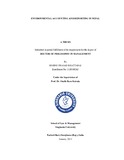Please use this identifier to cite or link to this item:
http://archive.nnl.gov.np:8080/handle/123456789/332| Title: | ENVIRONMENTAL ACCOUNTING AND REPORTING IN NEPAL |
| Authors: | BHATTARAI, BISHNU PRASAD |
| Keywords: | Economic development across the world has social and environmental impacts that result in social problem, global warming, natural disasters and pollution. |
| Issue Date: | 24-Mar-2019 |
| Abstract: | Economic development across the world has social and environmental impacts that result in social problem, global warming, natural disasters and pollution. Many corporations have take as much as responsibility for social and environmental issues as they do for economic issues. One reason for this is that corporations show growing concerns at environmental degradations. More effective environmental laws and the legal systems throughout the world have become fails to economic progress and industrial growth. Environmental sustainability and material advancement go hand in hand. Due to the increasing global concern for the environment, the demand for increased stakeholders reporting has become crucial for environmental accounting. The present study is concerned with environmental accounting and reporting of Nepalese manufacturing and hotel enterprises listed in Nepal Stock Exchange. For this purpose the study has utilized primary and secondary data. The primary data were collected through two structured questionnaires. In order to find out the differences in the perception of the preparers and users regarding the need for a specific regulatory framework (including accounting guidelines, principles, and standards) for environmental accounting and reporting of listed Nepalese companies. The secondary data were collected accessed through the annual reports through personal visits to the corporate offices of sample companies. The annual reports of 16 listed companies cover the period 1998 - 2012. To achieve the research objectives, two different weights for EDS (environmental disclosure score) have been employed in this study. The bases for secondary data analysis of the sample companies have been empirical evidences of different countries research on this issue. EDS has been calculated for each year – one by using equal weights and another by assigning unequal weights. To analyze the extent of environmental disclosure, 23 identified disclosure items in the score sheet have been utilized to capture these items from the company's annual reports. The descriptive statistics, correlation and regression analysis have also been employed to analyze the secondary |
| URI: | http://103.69.125.248:8080/xmlui/handle/123456789/332 |
| Appears in Collections: | 500 Natural sciences and mathematics |
Files in This Item:
| File | Description | Size | Format | |
|---|---|---|---|---|
| Environmental Accounting and reporting in Nepal (Sub Thesis)Final 419.pdf | 5.3 MB | Adobe PDF |  View/Open |
Items in DSpace are protected by copyright, with all rights reserved, unless otherwise indicated.